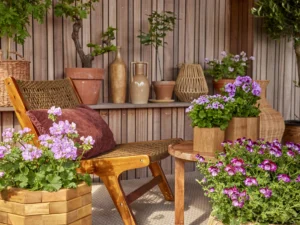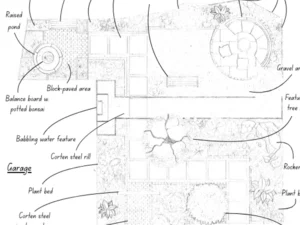When it comes to garden design, many designers face the dilemma of whether to focus on a specific niche or remain more generalist in their approach. Specialising in one style or staying versatile both have their advantages and challenges. This article explores the pros and cons of each path and provides insights on how garden designers can decide what approach is best for them.
What Finding Your Niche Means in Garden Design
In garden design, finding your niche means honing in on a specific style, method, or philosophy that you specialise in. A niche could be designing modern minimalist gardens, focusing on wildlife-friendly landscapes, or even catering exclusively to urban spaces. By narrowing your focus, you position yourself as an expert in that particular field, attracting clients who are seeking something specific that aligns with your strengths.
Is Finding Your Niche Too Restrictive or Does It Allow You to Excel?
Some designers worry that finding a niche could restrict their creativity, limiting the variety of projects they can take on. While it’s true that specialising might mean turning away clients outside your focus, it can also be incredibly empowering. By concentrating on a particular style, you’re able to refine your techniques and truly excel. This depth of expertise can lead to higher-quality designs and a reputation for excellence in your chosen niche.
However, for some, the idea of sticking to one approach may feel stifling, especially if they enjoy the challenge of adapting to different client needs. In that case, remaining flexible as a generalist may be a more fulfilling option.
Different Ways to Find Your Niche
Finding your niche doesn’t have to mean just picking a design style like modern, traditional, or Japanese gardens. You can also focus on other aspects, such as sustainability or wildlife-friendly design. For example, you could build a reputation for creating eco-conscious gardens that prioritise native plants and water conservation, or you could specialise in sensory gardens designed for mindfulness and relaxation. Niches can also be based on client type, some designers focus on residential projects, while others might work with commercial properties or public spaces.
The Benefits of Remaining a Generalist
Remaining a generalist allows you to appeal to a wider customer base and keeps your design options open. As a generalist, you can adapt to different client preferences, working with various garden styles and requirements. This can be particularly beneficial for new designers who want to gain experience across a range of projects. A broader focus also offers creative freedom, letting you experiment with multiple techniques and aesthetics, which can make your portfolio more diverse.
Additionally, many clients don’t have a specific design style in mind and are looking for guidance. Being a generalist means you’re able to cater to a range of tastes and needs, potentially drawing in more inquiries and opportunities.
Applying the Principles of Garden Design to Both Niche and General Design
Garden design principles like balance, proportion, and functionality apply universally, whether you’re working in a specific niche or as a generalist. Here are three examples of how these principles apply in different scenarios:
- Niche: Wildlife-Friendly Garden Design
- Balance: Create a balance between biodiversity and aesthetic appeal by integrating bird-friendly plants and pollinator-attracting flowers without overwhelming the design.
- Proportion: Use native plants that work with the natural surroundings to maintain ecological balance while still considering the size and space of the garden.
- Functionality: Incorporate features like bug hotels, nesting boxes, and wildflower meadows that serve both wildlife and client needs.
- Niche: Urban Garden Design
- Balance: In a small urban garden, balance hardscaping with soft planting to make the space feel welcoming and green, even in limited space.
- Proportion: Work with vertical planting to make the most of confined areas while keeping the design proportional to the space available.
- Functionality: Focus on low-maintenance plants and compact furniture, which suits the busy lifestyle of urban clients.
- Generalist Approach
- Balance: Use varying textures and colours to create harmony between different elements of the garden, whether you’re working with a traditional or contemporary design.
- Proportion: Maintain proportionality between plants, paths, and seating areas, ensuring that no one element overpowers another, regardless of the style or size of the garden.
- Functionality: Design the space to accommodate a range of activities, from entertaining to relaxation, making sure it works for different client needs.
How NGS Can Help with Your Garden Design
At Norfolk Garden Services, we offer expert garden design services suited to your needs, whether you’re looking for a specific niche style or a more general approach. Our experienced team can guide you through every step of the process, from initial consultation to the final layout. We provide personalised recommendations based on your vision, location, and lifestyle, ensuring that your garden not only looks stunning but also serves a practical purpose.
If you’re unsure whether to pursue a niche or stay generalist, we can help you explore the possibilities and find a path that aligns with your passions and skills. Whether it’s creating a wildlife-friendly haven, an eco-conscious landscape, or a versatile family garden, NGS has the expertise to bring your garden dreams to life.
By choosing NGS, you’ll benefit from a team with a deep understanding of local Norfolk gardens and environments, making your outdoor space truly shine, no matter the design direction. Get in touch today to begin your garden’s transformation via the Contact Us button at the top of the page!
Further Reading
If you enjoyed reading this blog then check out the articles listed below to expand your knowledge of garden design even further!
Your Garden: The Answer to the Cost of Living Crisis
Contemporary vs Traditional Garden Ideas – Secrets of 11 Fascinating Styles














